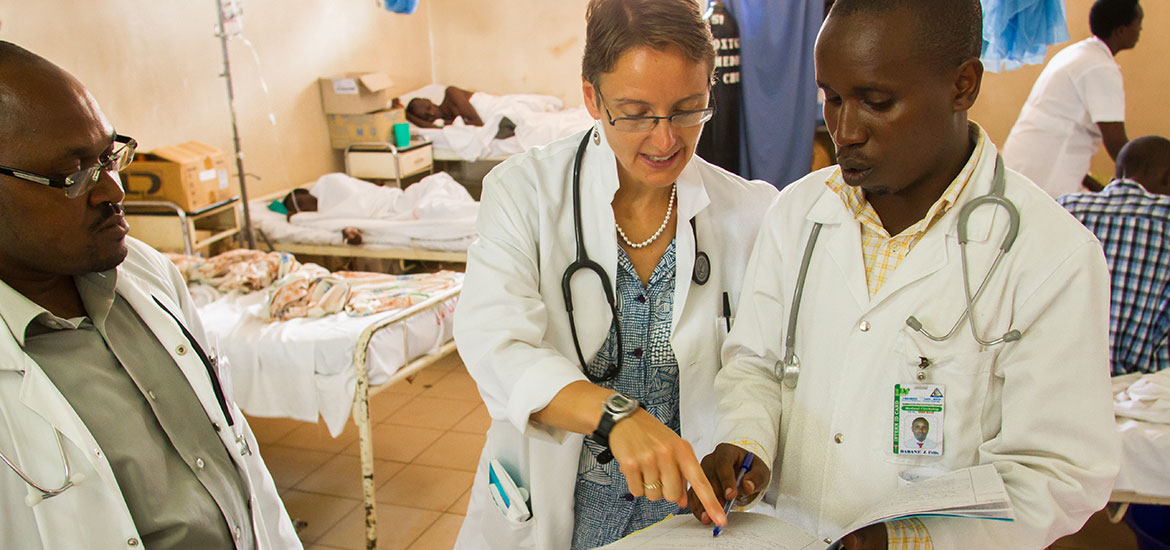
Philanthropic gifts from four families totaling $7 million will support health equity programs across Dartmouth College and the Geisel School of Medicine. The gifts will accelerate the growth of the new Center for Global Health Equity, bringing together thriving international and domestic health equity programs at Geisel and Dartmouth’s Dickey Center for International Understanding.
The Center and these gifts are part of The Call to Lead campaign and align with the vision of Dartmouth President Phil Hanlon ’77 “to prepare wise leaders who will take on the world’s greatest challenges.”
In the campaign, the Center for Global Health Equity has laid out a bold vision for a new paradigm in global health education and practice—a paradigm based on equity and reciprocity between elite academic institutions, such as Dartmouth, and partners in medically underserved regions, who often provide extensive experiential learning opportunities for U.S. students.
“Under the leadership of Dr. Lisa V. Adams, Dartmouth and Geisel have built strong, equitable relationships with multiple communities in the U.S. and abroad,” said Duane Compton, PhD, Dean of the Geisel School of Medicine. “These partnerships provide unparalleled learning opportunities for medical students, graduate students, and undergraduates—developing in them the interpersonal skills, cultural humility, and experience needed to work effectively in global health in the future.”
The $7 million in new gifts will fuel a variety of health equity initiatives, including the expansion of global health equity internships for undergraduates, graduate students, and medical students. At Dartmouth, nearly 30 percent of medical students and 10 percent of undergraduates list global health as one of their top areas of academic interests, and student applications for global health internships far exceed the current capacity. Importantly, the Center for Global Health Equity will also expand reciprocal internships for medical students from partner locations—including China, Kosovo, Rwanda, and Tanzania—and invest in its partner network to share best practices and provide learning and professional development opportunities.
“To be effective in our global health work, we are radically shifting our language, attitudes, and practices to build equitable partnerships” said Adams, an associate professor of medicine and epidemiology at Geisel, founding director of the Center for Global Health Equity, and a 1990 graduate of the medical school. “This becomes particularly important when we collaborate across a great income divide to partner with institutions and communities in low-income countries. We’ve learned that if a world with health equity for all is our vision, equity in partnership is the means to achieve it.”
The impact of Dartmouth’s health equity approach can be seen in multiple successes. In Tanzania, for example, a nearly 18-year partnership has led to the opening of the country’s first pediatric HIV clinic, the development of a new vaccine for tuberculosis—a disease which kills more than one million annually worldwide—and dozens of educational, research, and clinical opportunities for both Dartmouth and Tanzanian students and faculty. Other successes include the training of Rwanda’s healthcare workforce, maternal- and child-health improvements in Kosovo’s healthcare system, and a growing number of Dartmouth graduates populating the ranks of leading global health institutions.
“We hope that these gifts from four visionary families will inspire others in the Dartmouth alumni community to give to these transformative programs,” said Adams. “Their generosity will impact generations of Dartmouth students and advance health equity in medically underserved communities around the world.”
To learn more about the Center for Global Health Equity and its campaign goals, and to see a list of its partnerships, visit Dartgo.org/campaign-CGHE.